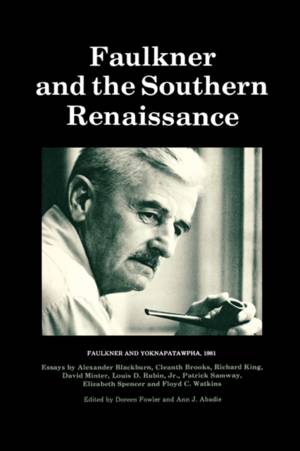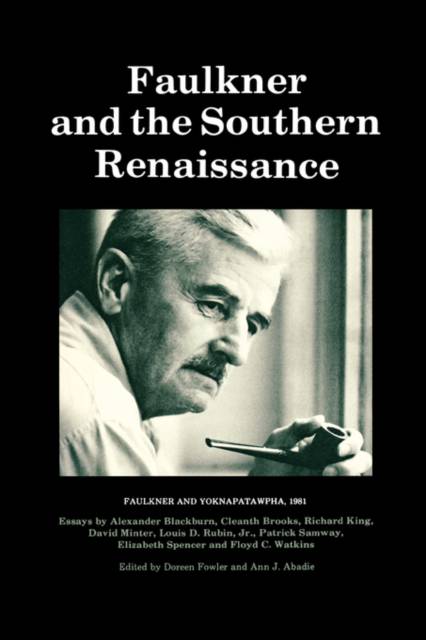
Bedankt voor het vertrouwen het afgelopen jaar! Om jou te bedanken bieden we GRATIS verzending (in België) aan op alles gedurende de hele maand januari.
- Afhalen na 1 uur in een winkel met voorraad
- In januari gratis thuislevering in België
- Ruim aanbod met 7 miljoen producten
Bedankt voor het vertrouwen het afgelopen jaar! Om jou te bedanken bieden we GRATIS verzending (in België) aan op alles gedurende de hele maand januari.
- Afhalen na 1 uur in een winkel met voorraad
- In januari gratis thuislevering in België
- Ruim aanbod met 7 miljoen producten
Zoeken
Faulkner and the Southern Renaissance
€ 59,45
+ 118 punten
Omschrijving
Faulkner and the Southern Renaissance (Papers presented at the 1981 Faulkner and Yoknapatawpha Conference at the University of Mississippi) Edited by Doreen Fowler and Ann J. Abadie Contributors: Alexander Blackburn, Cleanth Brooks, Richard King, David Minter, Louis D. Rubin, Jr., Patrick Samway, Elizabeth Spencer, and Floyd C. Watkins What is the Southern Renaissance? Who are its major figures? Why did it happen? What role did William Faulkner play in its advent? These are some of the questions scholars attempted to answer at the 1981 Faulkner and Yoknapatawpha Conference. The history of the Southern Renaissance has not yet been written, and its relationship to its leading figure, William Faulkner, has still not been fully explored. At the 1981 conference entitled "Faulkner and the Southern Renaissance," noted scholars of Southern literary history gathered to define and describe this startling literary phenomenon. It was in the 1930s that the rest of the nation first noticed that something important was happening in the South. A powerful and eloquent new voice was issuing from a seemingly improbable place, the rural, agrarian Southland. In every literary genre, an emphatically Southern accent was making itself known, and today that accent is still being heard all over the world. Faulkner was the first and unquestionably the greatest exponent of this new Southern literature, but his voice was soon joined by a chorus of others: John Crowe Ransom, Allen Tate, Robert Penn Warren, Flannery O'Connor, Carson McCullers, Katherine Anne Porter, Eudora Welty, James Dickey, Richard Wright, Walker Percy, William Styron, Reynolds Price, Elizabeth Spencer, and a host of others. This literary flowering, this amazing proliferation of Southern letters which began in the 1930s and continues to the present day, is called the Southern Renaissance. The papers contained in this volume take a major step toward explaining this extended period of extraordinary literary productivity. Together, these essays form a philosophical as well as critical inquiry into a cultural movement that resists simple or rigid categorizations.
Specificaties
Betrokkenen
- Uitgeverij:
Inhoud
- Aantal bladzijden:
- 284
- Taal:
- Engels
- Reeks:
Eigenschappen
- Productcode (EAN):
- 9781604732016
- Verschijningsdatum:
- 1/09/1982
- Uitvoering:
- Paperback
- Formaat:
- Trade paperback (VS)
- Afmetingen:
- 152 mm x 229 mm
- Gewicht:
- 439 g

Alleen bij Standaard Boekhandel
+ 118 punten op je klantenkaart van Standaard Boekhandel
Beoordelingen
We publiceren alleen reviews die voldoen aan de voorwaarden voor reviews. Bekijk onze voorwaarden voor reviews.








